September 28, 2025, Osaka Church
In the Name of the Father, and of the Son, and of the Holy Spirit
“For us people, and for our salvation, He was nailed to the cross at the time of Pontius Pilate and suffered…” (Nicene-Constantinople Creed)
Jesus suffered on the cross for our salvation. His suffering was necessary for our salvation. The 14th-century Byzantine Father Cabasilas also said: “At the Last Supper, the Lord showed us the bread and wine, saying, ‘This is broken for you, and poured out for you.’ He did not say, ‘This is my body, which has raised the dead and cleansed the lepers, and has done miracles like these.’ He focused our attention not on his many spectacular miracles, but on his passion and suffering. This is because the suffering of the Lord was more necessary than the miracles…”
But why?…
Because life in this world is painful. And that suffering must have meaning.
Christ is God made man. The early church glorified this mystery: “He emptied himself, taking the form of a servant, and was born in human likeness, being like men, and humbled himself to the point of death, even death on a cross.” The Lord bore all that we bear. Not for us, but with us. If the Lord suffered the punishment for our sins on the cross “in our place,” then why are we still suffering?
The suffering of Christ, God made man, transform our suffering into suffering shared with God, and changed it to be a pathway to resurrection. Only in this way does the suffering on the cross have meaning for our salvation, and our own suffering is not meaningless. If we do not believe this, then the sufferings of this world are nothing more than an absurdity that merely fuels meaningless, undirected resentment until they eventually consume us. Who could possibly tell someone to “endure” such suffering?
“God is unfair! Why am I the only one who is so unfortunate?” This is a truly earnest and honest cry. No one can judge those who cry out like this as lacking in faith. No one has the right to smugly imitate the apostles’ saying, “God will not give us a trial that we are unable to bear” (1 Corinthians 10:13). The answer to this cry cannot be found in this world.
Even the Lord Jesus did not judge our cries of “Why, God?” On the contrary, he himself cried out from the cross, “God, God, why have you forsaken me?” What a God! He shared in the ultimate human suffering and ultimate loneliness of being “ignored by God” and “forsaken even by God.”
However, there is a paradox here: a joy that shakes us from the deepest depths of our being and overflows with us. The loneliness that is shared is no longer loneliness. All of our suffering has been transformed into something “necessary” for our journey toward life, guided by and together with Christ, the One who is life, toward Him who is life. Herein lies hope: the hope that if we accept the love of God/Christ and in turn willingly share in the suffering of the cross, we can walk with Him on the path to resurrection, to life. It was this hope that encouraged us to be baptized, and no matter how many times we feel discouraged, we return to it and renew our faith.
On the Feast of the Universal Exaltation of the Cross, the Lord’s Cross is beautifully decorated with flowers, prostrated before and kissed. Rather than a cross that atones for our sins, what we see here is a cross that “gives life,” a sign of the victory of the One who declared, “Do not be afraid, I have overcome the world.”

